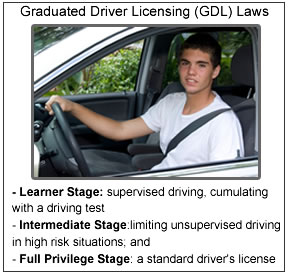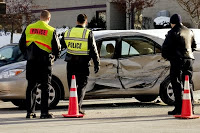Tag Archive: car crashs

Teens Most Likely To Crash In Their First Month Of Solo Driving
August 16, 2012
- failure to reduce speed,
- inattention, and
- failure to yield.

Teen Driver Safety – When the Crash Isn’t Avoided
June 23, 2010
More often than not, teenagers are taught how to avoid vehicle crashes as opposed to correct procedures if they are ever a crash. Obviously, new drivers are taught defensive driving techniques to ensure their safety on the roadways and to minimize their risks. However, odds are that most teenagers will be involved in at least a minor crash.
The period of time between Memorial Day Weekend and Labor Day is when the most teenagers are involved in vehicular crashes. Below, you will find a basic checklist of things you should go over with your teenager to provide a better understanding of what to do after as well as the insurance aftermath from the crash.
- Discuss insurance basics: If you haven’t already explained to your teenager how insurance rates and premiums work, this is probably a good place to start. Explain why it costs much more to insure an experienced driver and explain the savings associated with a good driving record.
- Consider a contract: A teen driving contract would outline what is expected of the teenager (i.e. safe driving practices, curfews, etc). It would also outline who would cover the rise in insurance costs following a crash and any other consequences your teenager would face as a result of failing to live up the expectations you outlined.
- Insurance and Registration should be in the glove box: Make sure your teenager knows to have the insurance card and registration in a place that is easily accessible and won’t get lost. The glove box is the ideal place.
- Some additional things to consider keeping on hand: A small first-aid kit, self-lighting emergency flares, a disposable camera, a small notebook and a pen to take down another driver’s contact information, and lastly, names/numbers for rescue personnel to contact.
- Document the Crash: Photograph the incident, even if there is minimal damage. If you don’t have a disposable camera in your car the camera on your phone will suffice. If there were any witnesses make sure to get their names and numbers. Witnesses can help you sort out details later.
- File a police report: it is best to file a police report and have it recorded. This is the choice of both drivers to determine even if it was just a fender bender.
- Don’t place blame: Getting involved in a game of finger pointing with another driver is never a good idea. Instruct your teenager to wait in the vehicle until the police arrive if the other driver is trying to confrontational. No good can come from getting in a fight with the other driver.
Even if you think you were at fault, you may not be. That’s why insurance agents recommend that you not accept fault or blame at the scene. It is best to let the police officer sort it out.
